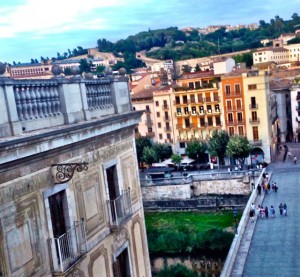
This is part of a series on “Traveling in Europe: 10 Travel Lessons.” To read main article, click here.
The biggest single expense (at home and especially while traveling) is accommodation. I am fortunate to have wonderful friends who provided me comfortable places to stay and I often plan my travels around these generous offers. So, I encourage you to ask your friends and social networks for connections and recommendations for where you’re going. Having local connections, even if you don’t stay with them, will greatly enhance your experience of a place. Read more about this here. Here are some possibilities to consider:

Housesitting: Trusted Housesitters and Housesitters UK, offer house/garden, and usually pet care in exchange for home stays. There is a lot of competition especially in popular places, so write a great profile, follow the site and contact the owner immediately to apply. Some owners’ expectations seem absurd to me – 5 horses, 12 chickens, 3 dogs, 14 cats – so be mindful of the commitment, that it makes sense to you. These websites have a small annual fee that more than pays for itself in one gig.
Servas: an international peace organization based on Gandhi’s idea that peace is built one friendship at a time. It is the longest and most established organization of its kind, offering travelers a way to find hosts all over the world. You do not have to be a host to be a traveler and vice versa, but most hosts are well traveled. The policy is that you stay 2 days, and more by invitation, and engage in getting to know your host. The application process requires some time and effort, so look into it and join weeks in advance of your travels. In the US, contact Servas here.
Couchsurfing: is a free online service based loosely on the Servas model but with virtually no screening process except reviews left by hosts and travelers. It seems many people have signed up and then not followed through by posting a profile or actually participating. Although I was a host in the early days of this website and had some fabulous guests, my sense is that it has become an “iffy” proposition.
Airbnb: is a fast-growing international business empowering homeowners (and even renters) to earn money by making a bed, room or whole house available for rent. Photos, description and reviews by previous guests give you a good sense of what you’re booking. Prices range from cheap to expensive, depending on the property and location, but often much less than a comparable hotel, and you pay a person not a corporation. You get to live like a local and may get to know the host, which can greatly enrich your experience. As both a host and guest for years, I could write a book on my nearly 100% positive experiences.
Monasteries, Convents, Universities: Many offer accommodation. These can be inexpensive and interesting options. Google the type of facility and location, e.g. “convent stay London” or “colleges in London offering stays for non-students.” Here’s a link to get you started.
Hostels: They’ve have come a long way since my first trip to Europe in the late 1970’s. While they still mostly cater to the young backpacking set with cheap beds in dormitories and shared baths, many now offer private rooms with en suites for singles, couples, friends and families. You’ll likely find convivial atmospheres with communal kitchens, lockers, and front desk security, and may meet some interesting people with valuable travel advice. Search “hostels in Europe” for numerous booking sites.
To explore other possibilities – such as house exchange, work programs, volunteer programs, intentional communities, service through civic organizations – search those keywords.
If you have more ideas and experiences, please leave your comments at the blog!
